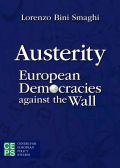James, H., Siegel, J., (2013), “The Birth of Fiscal Unions”, www.project-syndicate.org, 5 September. Fiscal unification is often an effective way to enhance creditworthiness, and it may also create a new sense of solidarity among diverse peoples living within a large geographic area. For this reason, Europeans have often looked toward the model of the United States. But they have never been able to emulate it, because their motivations for union …Read More
Ireland gets the new Trio Presidency off to a propitious start
Piedrafita, S., (2013), “Ireland gets the new Trio Presidency off to a propitious start”, CEPS Commentary, 28 August. The Irish Presidency of the Council of the EU (January-June 2013) faced numerous challenges, not the least of which was to negotiate the financial framework for the period 2014-2020 and the reform of the Common Agricultural Policy with the European Parliament, together with the pressure to advance the banking agenda. Moreover, the …Read More
What Is European Integration Really About? A Political Guide for Economists
Spolaore, En., (2013), “What Is European Integration Really About? A Political Guide for Economists“, Journal of Economic Perspectives, Vol. 27, N.3, pp. 125-44. Europe’s monetary union is part of a broader process of integration that started in the aftermath of World War II. In this “political guide for economists,” we look at the creation of the euro within the bigger picture of European integration. How and why were European institutions …Read More
Representation in the European State of Emergency: Parliaments against Governments?
Puntscher, S., Wydraa, D., (2013), “Representation in the European State of Emergency: Parliaments against Governments?”, Journal of European Integration, Vol. 35, Issue 5, pp. 565-582. If governments allow themselves to be entirely bound to the decisions of their parliament, without protecting their own freedom to act, a break up of Europe would be a more probable outcome than deeper integration.’ The statement of the Italian Prime Minister and head of …Read More
Representation Deficits and Surpluses in EU Policy-making
Bellamy, R., Kröger, S., (2013), “Representation Deficits and Surpluses in EU Policy-making”, Journal of European Integration, Vol. 35, Issue 5, pp. 477-497. Representation and democracy are not always complementary. Sometimes the one undermines the other. Too much democracy can create a representation deficit, as occurs when majorities oppress or neglect minorities. However, the opposite can also arise. The over representation of different groups can undermine the processes whereby representatives are …Read More
Whose economic reform?
Pisani-Ferry, J., (2013), “Whose economic reform?”, www.project-syndicate.org, 30 July. Together with fiscal consolidation, structural reform is the new European mantra. International organizations and European Union bodies regard such reform as a prerequisite of economic recovery, growth, and alleviation of the unemployment plague.
Austerity: European democracies against the wall
Lorenzo Bini Smaghi, (2013), Austerity: European democracies against the wall, CEPS. The crisis in the eurozone has had a dramatic impact on the economic and social fabric of European countries. However important it may be, the economic dimension is only the symptom of a broader problem. The crisis is primarily political in nature. Lorenzo Bini Smaghi argues in this book that the crisis reflects the inability of western democracies to …Read More
Saving the Euro at the Cost of Democracy
Crum. Ben, (2013), “Saving the Euro at the Cost of Democracy”, Journal of Common Market Studies, Vol. 51, Issue 4, July 2013, p.p. 614-630 This article explores the implications of the financial crisis for the relationship between monetary integration and democratic government in the European Union (EU). As the crisis has exposed the original balance that economic and monetary union (EMU) sought to maintain between monetary integration and policy diversity …Read More
Portugal’s Political Crisis
Kirkegaard Funk, Jacob, (2013), “Portugal’s Political Crisis”, www.piie.com, 3 July. A political crisis has suddenly erupted in Portugal, spurred by deep divisions in the government of Prime Minister Pedro Passos Coelho, aggravated by years of austerity and bleak economic forecasts. The political turmoil has rattled financial markets and raised doubts about Portugal’s ability to recover from its long slump.Yet deteriorating economic fundamentals in Portugal did not cause this crisis. Political …Read More
High Level Group on Modernisation of Higher Education
European Commission, (2013), High Level Group on Modernisation of Higher Education, June 2013. The EU high-level group on modernisation of higher education publishes its first report today on improving the quality of teaching and learning in universities. The group, chaired by former President of Ireland Mary McAleese, makes 16 recommendations (see Annex 1) which include a call for mandatory certified training for professors and other higher education teaching staff, more …Read More





